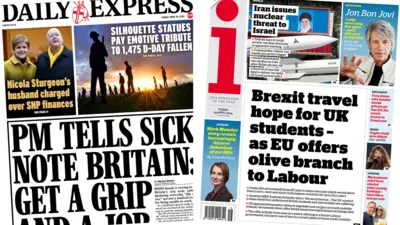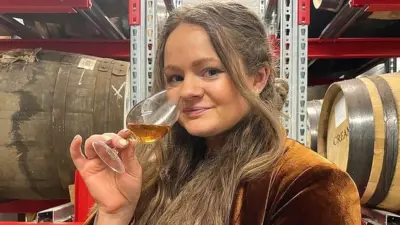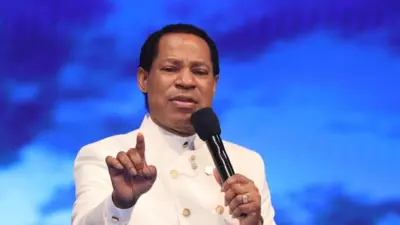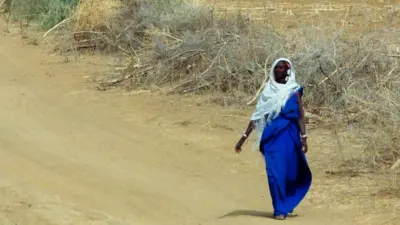We've updated our Privacy and Cookies Policy
We've made some important changes to our Privacy and Cookies Policy and we want you to know what this means for you and your data.
Free trade area, single market, customs union - what's the difference?
- By Jonty Bloom
- Business correspondent, BBC News
Image source, Getty Images
Two leading cabinet ministers have said that the UK will not remain in the single market or customs union during the transitional period planned for immediately after leaving the European Union.
The UK government is now set to spell out its aims for new customs arrangements.
But what is the difference between a free trade area, single market and a customs union?
SINGLE MARKET
You can be in the EU's Single Market, but not the EU, this is what Norway, Iceland and Liechtenstein do.
The European Union's single market is perhaps the most ambitious type of trade co-operation. That's because as well as eliminating tariffs, quotas or taxes on trade, it also includes the free movement of goods, services, capital and people.
That is why there has been no limit on the number of French people who can come to the UK, or the number of British people who can live in Spain - but there are limits on Turks or Ukrainians, for example.
Also, a single market strives to remove so-called "non-tariff barriers" - different rules on packaging, safety and standards and many others are abolished and the same rules and regulations apply across the area.
Financial services
There are EU-wide regulations covering a whole host of industries and products on everything from food standards and the use of chemicals to working hours and health and safety. It is an attempt to create a level playing field and a single market; this does not happen in a free trade zone.
For goods, the single market was largely completed in 1992, but the market for services remains a work in progress a quarter of a century later. The EU has promised to introduce it many times, but several countries have dragged their feet and it is much more complicated than creating a single market for say, cars or computers. Even so, the City of London dominates financial services in the EU not least because it can do business in every member country.
The EU is therefore not just a free trade area - it is a single market.
But to stay in the single market, countries have to allow the free movement of goods, services, capital and people. That last one means immigration is difficult if not impossible to control - although the UK might get a special deal to allow some limits.
Membership of the single market also normally involves making annual payments towards the EU's budget and accepting the jurisdiction of the European Court of Justice, which would cross quite a few red lines for many Brexiteers.
CUSTOMS UNION
Turkey is part of a customs union with the EU but not in the single market. The deal does not cover food or agriculture, services or government procurement.
The EU is not only a single market - it is also a customs union. The countries club together and agree to apply the same tariffs to goods from outside the union.
Once goods have cleared customs in one country, they can be shipped to others in the union without further tariffs being imposed.
If the UK left the Customs Union but stayed in the Single market, our exporters would have to contend with what are called 'rules of origin'.
These rules are designed to demonstrate that goods that legally originated in the UK - and did not contain more than the maximum permitted level of parts and components from elsewhere - qualify for duty-free entry into the EU.
Fish factor
That could be complicated for many companies that import components from around the world to put into finished products made in the UK.
Image source, Christopher Furlong
Also services are a huge part of the British economy, 78%, and are not totally covered by a customs union because they tend to face "non tariff" barriers.
Still the UK could opt to leave the single market but stay in the customs union, but that does mean it couldn't negotiate free trade deals with other countries, the EU does that.
It might also mean paying money to the EU and accepting ECJ judgements when they relate to trade and it is unlikely to cover farm produce or fish since the UK would not be in the Common Agricultural Policy or Common Fisheries Policy.
A customs union does however have one big advantage, it means the Ireland/Northern Ireland border would remain open and easy to cross.
FREE TRADE AREA
If we left both the single market and the customs union we could negotiate a free trade deal with the EU. A free trade area is one where there are no tariffs or taxes or quotas on goods and/or services from one country entering another.
The negotiations to establish them can take years and there are normally exceptions.
So agriculture and fisheries might be exempted, certain industries protected and some goods may not be covered.
Irish issues
Services like banking and education also pose a problem in many free trade deals, as the barrier to trading services are not normally tariffs, but so called non-tariff barriers like different rules, standards and qualifications.
So the negotiations can be very long and complicated and the result can still leave many barriers to trade.
Image source, Getty Images
There is a free trade zone in Europe and we helped to create it: EFTA, the European Free Trade Association. It counts Norway, Iceland, Switzerland and Liechtenstein as members, but they now have a very close relationship with the EU; all but Switzerland are part of the single market.
The EU also has free trade arrangements with many other countries around the world; so it is not against negotiating one with the UK in principle, but compared with staying in the single market or the customs union this would be the "hardest" form of Brexit. It would also almost certainly mean border controls including between Ireland and Northern Ireland.
Top Stories
Features & Analysis
Most read
Content is not available








